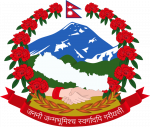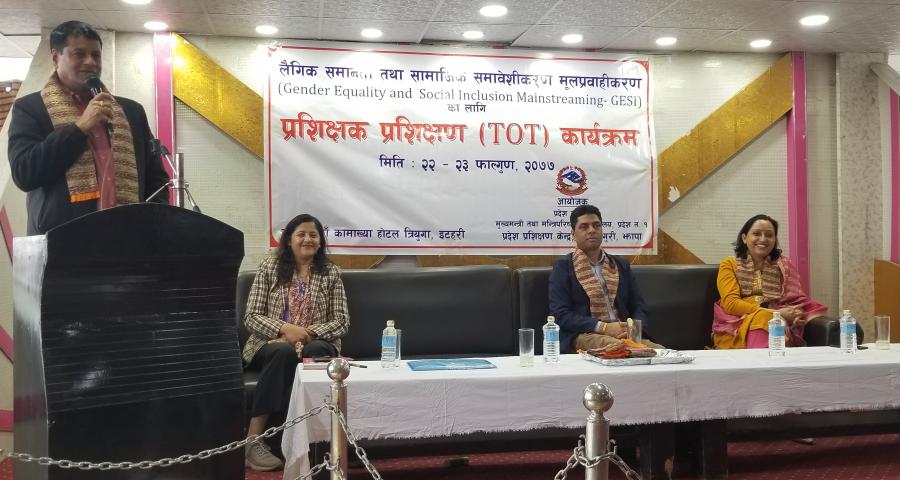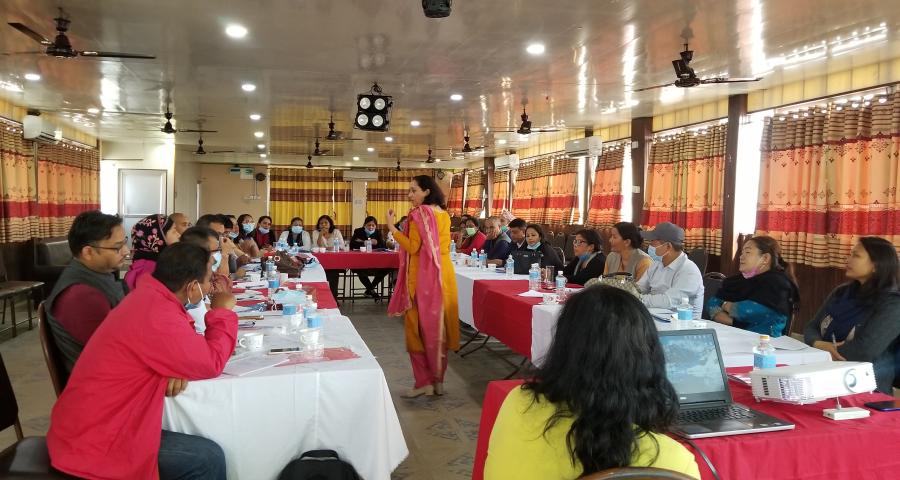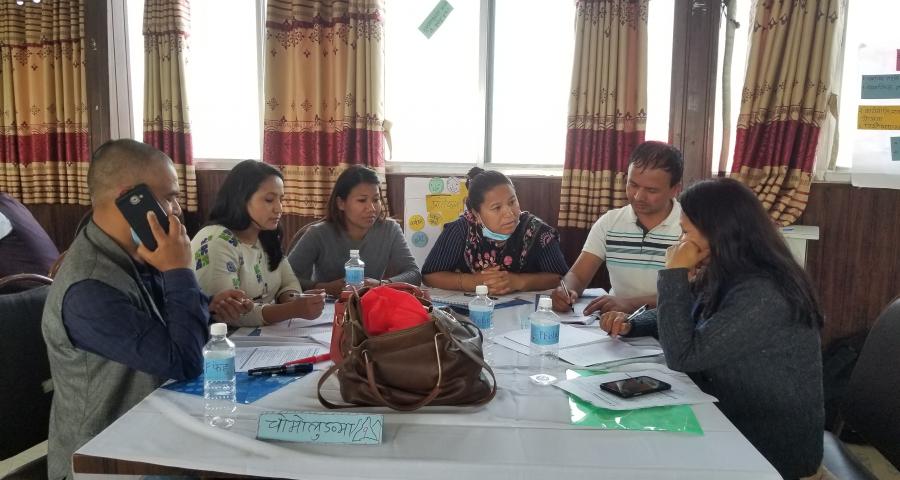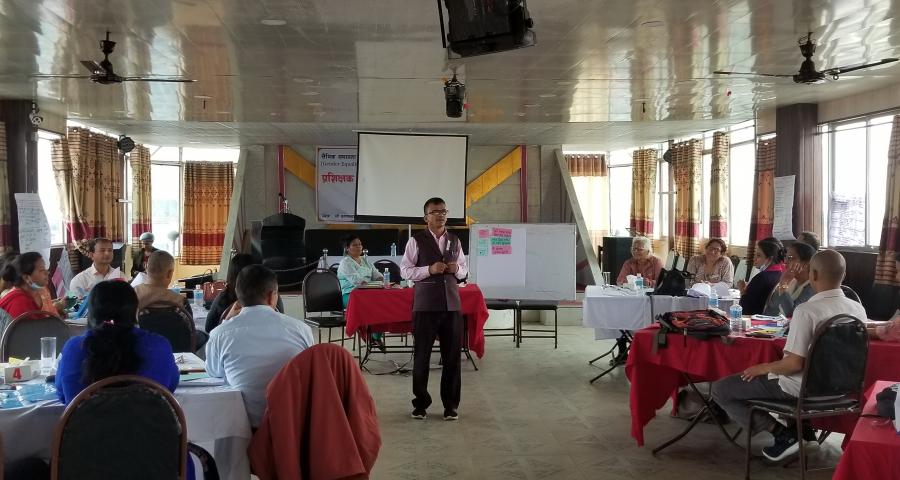Background
In the background of restructured Nepal as a federal state with three tiers government with the opportunity to exercise the power pursuant to the Constitution and law, PLGSP as a national flagship program has been implemented with the goal to achieve fully functional, sustainable, inclusive and accountable provincial and local government. In line with the vision of the constitution to promote inclusive and equity-based society with prosperity and social justice; Local Government Operation Act, 2074; and commitment made by the state at international level regarding gender equality and social inclusion, GESI mainstreaming should be adopted as one of the main strategies to end inequalities and discriminations based on gender, ethnicity, region, class, ability, sexual orientation etc. PLGSP has planned GESI mainstreaming training at all Local Governments to ensure the integration of GESI mainstreaming in local government policy, programs, planning process, budgeting and service delivery to make them GESI sensitive as well as GESI responsive. Hence, it is essential to have ToT in order to build a common understanding about the objectives and expected outcomes of GESI mainstreaming training along with the content as well as training methodology in order to ensure quality and uniformity.
Objectives
- To build common understanding regarding the objectives and expected outcomes; as well as content and training methodology among the resource person who will be mobilized in LG to facilitate GESI mainstreaming training.
- Increase conceptual clarity and understanding on GESI as well as national and international law and provisions on GESI
- Enhance clarity on GESI mainstreaming throughout local level planning process and gender responsive budgeting
- Enhance clarity and skill to facilitate SWOT analysis and to prepare GESI mainstreaming Action plan
Methodology
Two days ToT on GESI Mainstreaming has been conducted on 6 – 7 March, 2021 at Ma Kamakhya Hotel Triyuga in in participation of 31 participants. The disaggregated data of the participant shows 20 women and 11 men. Among them 18 are from Brahmin/Chhetri, 11 from Janajati and 2 from Dalit community.
The opening session of the program was formally chaired by the Director of Province Training Centre, Mr. Ganesh Prashad Timsina and the Chief guest of the ceremony was Under Secretary, MoFAGA/National Program Manager of PLGSP Mr. Chiranjibi Timsina. Chief Women Development Officer of Ministry of Social Development Ms. Durga Baral and Local Governance Expert Ms. Anita Guragain chaired as the guest. The program begun with the national anthem and was formally inaugurated by the Chief Guest by lighting panas. Following that, LG expert Ms. Guragain briefly shared about PLGSP and gave welcome remarks. In his remarks, the Chief Guest emphasized the significance of PLGSP in building both individual as well as institutional capacity of provincial and local government. He also highlighted the role of the participants of the ToT program in contributing towards facilitating GESI mainstreaming in LG to materialize what’s provisioned in the constitution and Local Government Operation Act. He also wished for the interactive training program and also for the success of the training. In his closing remarks, the Chair-person highlighted the need to promote GESI mainstreaming as a Common Campaign to identify gaps and weaknesses in structure, process and working modality and to act accordingly to meet the common goal of gender equality and social inclusion.
Following the inauguration session, GESI Expert Ms. Tshering Yodin Sherpa commenced the technical session by explaining about the objectives of the training. Participants were asked to introduce their name, address, organization (if any) and also their experience in GESI. Participants (potential resource person for GESI mainstreaming training) were from diverse background with range of experience in GESI. To assess the level of understanding of the participants, pre-test form was distributed and participants did self-assessment by ranking their knowledge level. Since the participants of the ToT were not new to the concept of GESI, the objective of the ToT was not to focus more on conceptual clarity but to build common understanding about why, what and how we are supposed to facilitate GESI mainstreaming training under PLGSP.
A basic ground rules of the training was shared and agreed upon by the participants. After setting the ground rules, sessions on conceptual clarity on GESI; national laws and commitment along with international law and provisions related to GESI were facilitated by Durga Baral, Chief Woman Development Officer, Social Development Ministry of Province 1. Theoretical session on GESI mainstreaming, role of LG in GESI mainstreaming and Gender Responsive Budgeting (GRB) were facilitated by the Resource Person Kusum Bista, a freelance consultant. Participants were given a copy of GRB indicators and they were asked to assess any plan/program using GRB indicators. It provided them with the opportunity to get clarity about GRB and its importance in GESI mainstreaming. Resource Person made a strong observation of the participants throughout the sessions and also planned a micro teaching session to evaluate presentation skills and understanding levels of the participants.
Second day of the training begun with a session on seven steps of planning process and GESI mainstreaming in planning process. Participants were divided into six groups and were asked to come up with ideas regarding GESI mainstreaming in planning steps. Participants were guided to facilitate SWOT Analysis of LG in terms of GESI mainstreaming and they were also allowed to have a group work related to SWOT. This way, participants gained clarity about the methodology they have to follow while facilitating in LG. Similarly, same approach was used in action plan preparation. Participants got opportunity to know and practice the way to facilitate LGs in preparing GESI mainstreaming action plan. Different methods such as presentation, game, group work, discussions were used to facilitate the session.
After the completion of all sessions on contents, micro teaching session was conducted. All the participants were given a topic for micro-teaching a preparation and the participants who were less involved during the sessions were asked to demonstrate from each six groups. Tentative evaluation of the participants in terms of their facilitation skills and understanding was made which would be helpful to mobilize the pool of resource person. A priority listing format was prepared and participants district wise priority was collected. Majority of the participants had prioritized districts such as Jhapa, Morang and Sunsari which have easy access to road.
At the end of the program, possible challenges that may arise while organizing and facilitating GESI mainstreaming training at LG were discussed. Since, the budget for GESI mainstreaming training is limited and doesn’t cover travel cost and allowances, one of the pertinent challenges could be motivating the participation of elected representatives.
Post-test and post evaluation was conducted which shows increase in participants level of knowledge and skills. Due to time constraint, a quick and informal closing session was conducted. Participants representing men and women groups gave their quick review about the training.
Key Decisions/Recommendations
- Handout materials as well as training resource materials will be shared with the participants.
- Those participants who had not yet enrolled in CDMIS as a Resource Person will immediately enroll in CDMIS with updated CV.
- Participants will submit their citizenship certificates, PAN number and bank details to the Province Training Centre.
- Participants will be shared reporting template, budget norms, design of the banner, attendance sheet, disaggregated data collection format, action plan template etc.
- Though majority of the participants prioritized easily accessible districts, Province Training Centre will prepare a Resource person mobilization plan and coordinate accordingly. Individual will be consulted and agreement will be signed before mobilization.
- Since, the budget for GESI mainstreaming training is limited and doesn’t cover travel cost and allowances, one of the pertinent challenges could be motivating the participation of elected representatives. Hence, PTC will circulate letter to LGs for their coordination and cooperation in ensuring proper participation of the participants.

